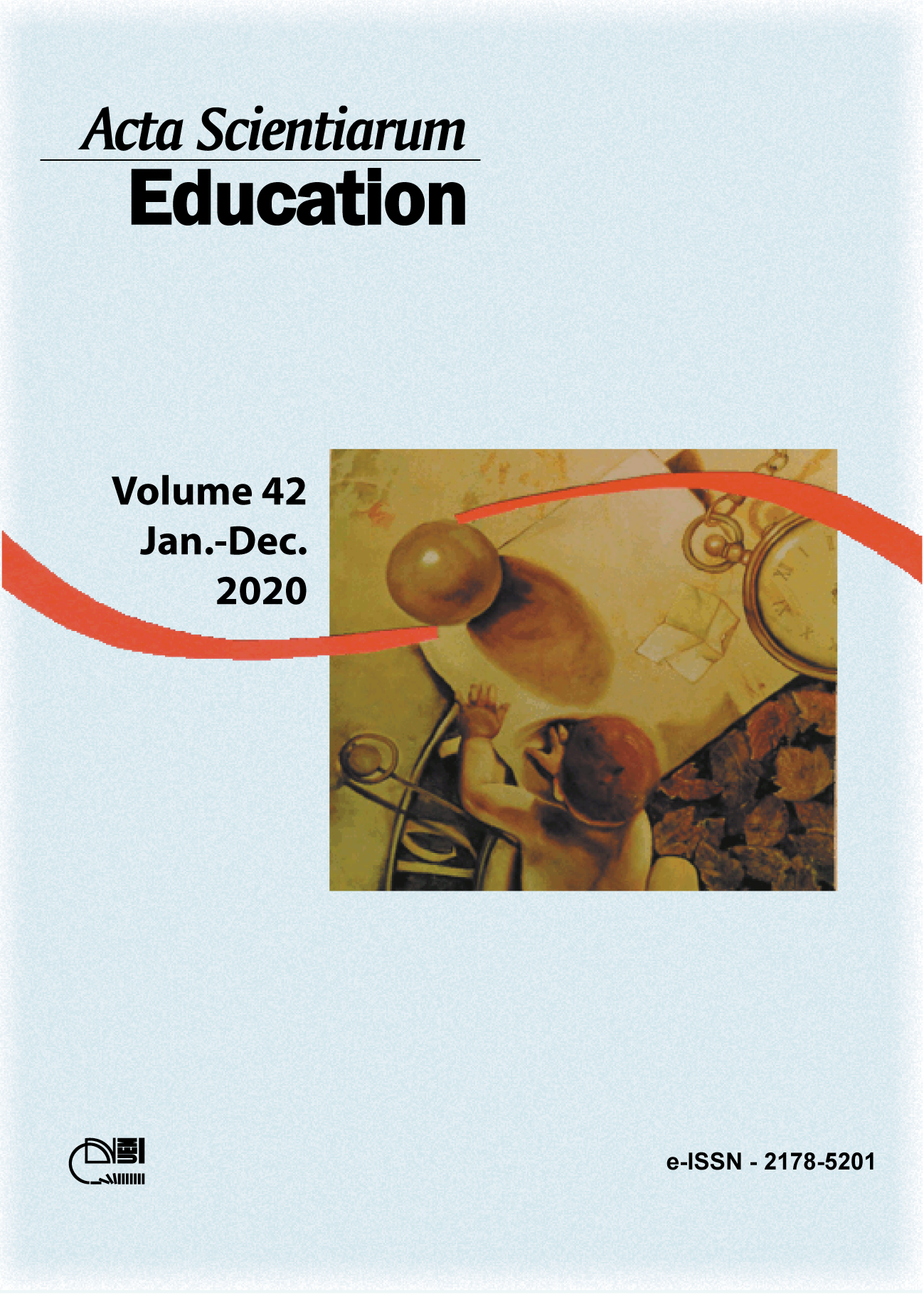A A ética nos estudos acerca do medievo
Resumo
A ética é matéria de reflexão da filosofia medieval, embora sem a centralidade tida pela especulação metafísica e análise lógica (Williams, 2018). Sem considerar o pensamento islâmico e judaico medieval, a ética cristã revela um conjunto de tópicos transversais (felicidade, amizade, liberdade, retidão) a vários domínios do saber (jurídico/lei, o econômico/lucro, religioso/pecado/salvação/graça). Os objetivos do texto visam, por um lado, mostrar que a ética, de matriz estoica e patrística, se inscreve no pensamento medieval como retidão de vida e, por outro, registar a sua presença na fase incoativa da universidade. A metodologia é de natureza analítica devido ao tipo de incursão que se faz nos textos. Os resultados expectados são de duas ordens: suprir o preconceito anti medieval e colocar a ética no roteiro de futuras leituras e investigações. O presente texto questiona o reducionismo retro projetivo que substitui a diversidade do pensamento ético medieval por um modelo ético único. A partir deste pressuposto questiona-se o uso singular do termo ‘ética’. Deve-se falar de ‘ética’ medieval ou de ‘éticas’ no período medieval? A resposta à pergunta descreve um ziguezague entre um e outro termo, consoante os autores evocados, os acontecimentos e os rumos de formação do mundo europeu.
Downloads
Referências
Agostinho, S. (1887). De catechizandis rudibus liber unus. In J.P. Migne (Ed.), Sancti Augustini, Hipponensis Episcopi Opera Omnia, Post Lovaniensium Theologorum Recensionem, Patrologiae Latinae (Tomo XL, p. 309-348). Paris, FR: J. P. Migne,.
Agostinho, S. (1993). Cidade de Deus (Vol. 3, J. Pereira, Trad.). Lisboa, PT: Fundação Calouste Gulbenkian.
Agostinho, S. (2007). As confissões de S. Agostinho [Conf.] (J. Ross, Trad.). Covilhã, PT: Universidade da Beira Interior.
Ambrósio, M. (1845). De officiis ministrorum. In J. P. Migne (Ed.), Patrologia latina cursus completus (Tomo XVI, p. 340-397). Paris, FR: J.P. Migne.
Aristóteles. (2007). Ética a Nicómaco. Lisboa, PT: Quetzal.
Ashby, W. (1997). A Comprehensive history of western ethics. What do we believe? Ann Arbor, MI: Prometheus Books.
Benedicti, S. (1955). Regula Monachorum (=RB, LXXIII). Denée, BE: Editions Maredsous.
Braga, M. De. (1950). De correctione rusticorum (A correção dos rústicos). In M. De Braga, & C. W. Barlow (Eds.), Martini Episcopi Bracarensis Opera Omnia (p. 183-203). London, UK: Oxford University Press.
Brun, J. (1986). O estoicismo. Lisboa, PT: Edições 70.
Buffon, V. (2005). Sur le bonheur. Thomas D'Aquin et Boéce De Dacie. Textes introduits, traduits et annotés par Imbach Ruedi et Ide Fouche Collection (Translatio. Philosophies médiévales, Vol. 46, n. 2). Paris, FR: Librairie Philosophique J. Vrin.
Cícero. (2000). Dos Deveres. Lisboa, PT: Edições 70.
Cícero. (2008). Tratado da República. Lisboa, PT: Círculo de Leitores.
Coccia, E. (2012). The teratology of morality, or ethics in the middle ages. Médiévales, 1(63), 13-26. DOI: 10.4000/medievales.6800
Costa, I., & Robert, A. (2012). Reconfigurations du discours éthique à la fin du moyen âge. Médiévales, 1(63), 5-12.
Davis, S. (1992). Early medieval ethics. In C. Becker (Ed.), A history of western ethics I (p. 45-53). New York, NY: Routledge.
Denifle, H., Chatelain, E., Samaran, C., & Moé, É. A. Van (1889). Chartularium Universitatis Parisiensis (Vol. 1). Paris: Éd. H. Danifle.
Ghisalberti, A. (2011). As raízes medievais do pensamento moderno (S. Ferreira, Trad.). São Paulo, SP: Instituto Brasileiro de Filosofia e Ciência ‘Raimundo Lúlio’.
Guilloux, P. (1928). L’amour de Dieu selon Saint Bernard. Revue des Sciences Religieuses, 8(1), 69-90.
Hadot, P. (1974). Exercices spirituels. Annuaire de i’ École Pratique des Hautes Études, 84(1), 25-70.
Hadot, P. (2002). Qu’est-ce que la philosophie antique. Paris, FR: Gallimard.
Hadot, P. (2014). Exercícios espirituais e filosofia antiga. São Paulo, SP: É Realizações.
Jaeger, W. (s/d). Paideia. A formação do homem grego. Lisboa, PT: Aster.
Kenyon, E. (2018). From Augustine to Eriugena. In T. Williams (Ed.), Companion to Medieval Ethics (p. 9-31). Cambridge, UK: Cambridge University Press.
Le Goff, J. (2000). Les intellectuels au moyen age. Paris, FR: Point.
Macintyre, A. (2007). After virtue. A study in moral theory. South Bend, IN: University Notre Dame Press.
Marrou, H.-I. (1948). Histoire de l’éducation dans l’antiquité. Paris, FR: Éditions de Seuil.
Meirinhos, J. (2007). Martinho de Braga e a compreensão da natureza na alta idade média séc. VI): símbolos da fé contra a idolatria dos rústicos. In J. Meirinhos (Org.), Estudos de filosofia medieval, autores e temas portugueses (p. 13-27). Porto Alegre, RS: Campos das Letras.
Ricouer, P. (1984). Fondements de l’ éthique. Autres Temps. Les cahiers du christianisme social, 1(3), 61-71. Doi: 10.3406/chris.1984.956
Séneca (2008). Cartas a Lucílio. Lisboa, PT: Fundação Calouste Gulbenkian.
Sevilha, I. d. (2004). Etimologías (Texto latino). Madrid, ES: Biblioteca de Autores Cristianos.
Testard, M. (1965). Cicéron. Les Devoirs (Vol. xx). Paris, FR: Les Belles Lettres.
Tomás de Aquino & Boécio de Dácia (2005). Sur le bonheur Thomas D'Aquin et Boéce De Dacie. Textes introduits, traduits et annotés par Ruedi Imbach et Ide Fouche. Paris: Vrin, 2005.
Trégo, K. (2005). De l'éthique de la sagesse à l'éthique de la liberte. La doctrine de la liberté d'Augustin à la lumière de ses sources philosophiques antiques. Revue des Sciences Philosophiques et Théologiques, 4(89), 641-653.
Ullman, R. (2000). A idade medieval. Porto Alegre, RS: Edipucrs.
Williams, T. (2018). Introduction. In T. Williams, The Cambridge companion to medieval ethics (p.1-6). Cambridge, UK: Cambridge University Press.
This work is licensed under a Creative Commons Attribution 4.0 International License.
DECLARAÇÃO DE ORIGINALIDADE E DIREITOS AUTORAIS
Declaro que o presente artigo é original, não tendo sido submetido à publicação em qualquer outro periódico nacional ou internacional, quer seja em parte ou em sua totalidade.
Os direitos autorais pertencem exclusivamente aos autores. Os direitos de licenciamento utilizados pelo periódico é a licença Creative Commons Attribution 4.0 (CC BY 4.0): são permitidos o compartilhamento (cópia e distribuição do material em qualquer suporte ou formato) e adaptação (remix, transformação e criação de material a partir do conteúdo assim licenciado para quaisquer fins, inclusive comerciais).
Recomenda-se a leitura desse link para maiores informações sobre o tema: fornecimento de créditos e referências de forma correta, entre outros detalhes cruciais para uso adequado do material licenciado.















































